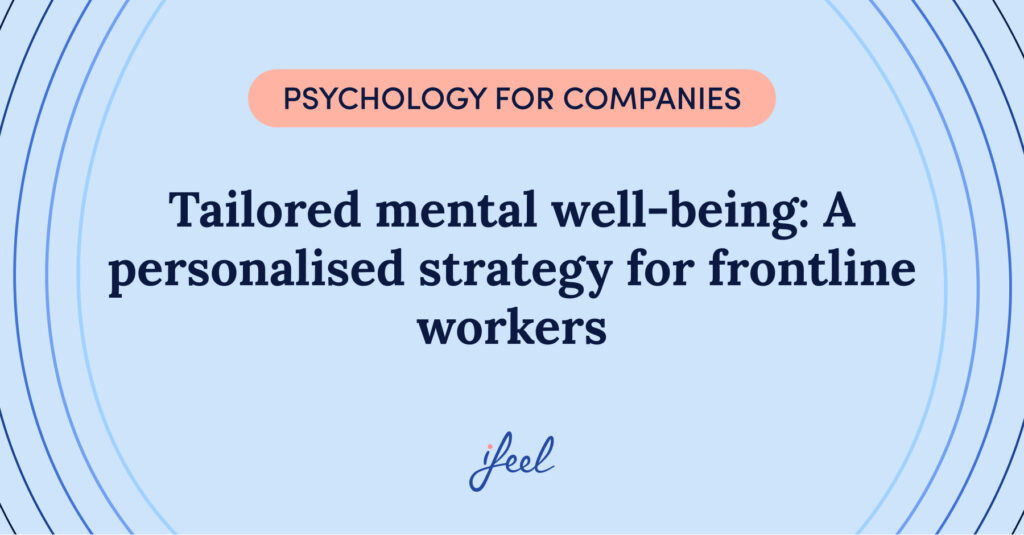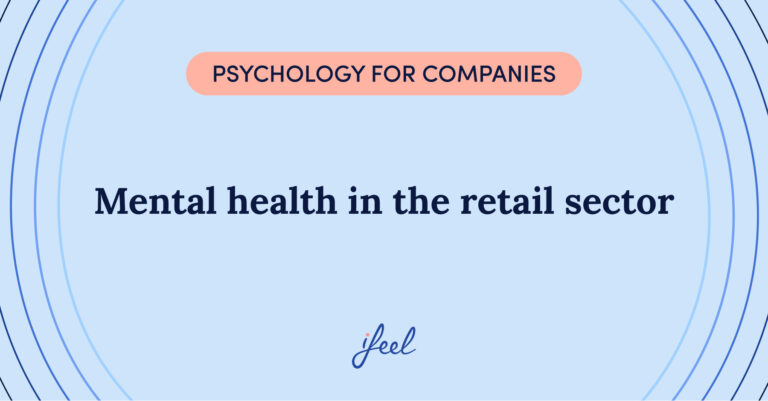Every company is a unique ecosystem, made up of a diverse range of employee profiles with specific dynamics and responsibilities: from office staff to plant operators and customer-facing workers. Naturally, each role brings different needs and expectations regarding the services the organisation can offer.
Faced with this reality, companies encounter a crucial challenge: ensuring mental well-being solutions are truly accessible to everyone, regardless of their role, location, or potential technological limitations.
At ifeel, we recognise that not all workers are in the same circumstances or have the same opportunities to access wellbeing resources. That’s why we created our “Right on Site” strategy, designed to break down these barriers and adapt to the diversity and complexity of every team.
Our commitment is clear: to bring mental well-being to every corner of the organisation, ensuring that all employees, regardless of their role or context, can benefit from equitable and effective access.
What does the strategy for frontline workers involve?
When we talk about a company’s workers, we’re not referring only to office staff. Think of factory employees who make product creation possible, or those in restaurants who ensure meals reach tables with impeccable service. Each of them is a key part of the organisation’s operation.
However, these workers often lack direct access to the technology that would allow them to use well-being resources quickly and easily. But this does not mean they should be excluded from the care their company owes them. At ifeel, we make sure that doesn’t happen, offering accessible solutions tailored to their specific needs.
In this sense, ifeel has designed a strategy specifically intended to cover all employee profiles within an organisation, from those in corporate offices to those working on the frontline of customer service or in operations. This includes:
- Customer-facing staff and operators, who often face time constraints and limited access to technological tools.
- Colleagues without corporate email, who need practical alternatives to connect.
- Employees of all generations, with varying levels of familiarity with technology.
Our aim is to remove the barriers that hinder access to mental well-being, ensuring that all colleagues can benefit from our solutions, regardless of their role or location.
Three key phases for success
To guarantee access for every employee, the strategy for frontline workers is built around three key phases, designed to maximise accessibility and engagement:
Pre-Launch: Preparation and personalisation
- Briefing sessions for managers, leaders, and unions, tailored to the specific needs of each group.
- Close, relevant communications designed to connect with employees’ reality.
- Prior testing with selected ambassadors, who build trust and anticipation among their peers.
Launch: Activation on site
- Events and interactive stands strategically located within facilities, designed to capture employees’ attention.
- Practical, dynamic workshops in high-traffic areas that encourage active participation.
- Useful, accessible merchandise that reinforces the well-being message.
- Simplified access via QR codes, SMS with encrypted links, or platforms that don’t require corporate email.
Post-Launch: Ongoing engagement
- Reactivation campaigns on key dates to maintain interest.
- Incentive programmes that promote continuous use of the platform.
- Support communities and interactive sessions that reinforce a culture of well-being within the organisation.
A personalised approach for all employees
Different types of employees face different kinds of problems. In particular, customer-facing staff, operators, and frontline workers face a series of unique challenges that can affect their mental and emotional well-being.
These issues, often invisible to organisations, require specific solutions to ensure resources are accessible and effective for all employees. Among them:
Main challenges faced by frontline workers
High levels of stress and constant pressure
- Customer-facing workers are often exposed to difficult interactions with clients or users, which can generate anxiety, frustration, and emotional exhaustion.
- Operators and staff in operational roles must meet tight deadlines, work in physically demanding environments, and manage intense workloads, which can lead to chronic stress.
Lack of access to well-being resources
- These employees often lack access to digital tools in the workplace, either due to the absence of technological devices or because they do not have corporate emails.
- Irregular schedules or rotating shifts make it difficult to participate in traditional well-being initiatives, such as in-person workshops or appointments at specific times.
Feeling invisible within the organisation
- Frontline workers often feel their needs are not prioritised compared to other roles within the company, which can lead to emotional disconnection and lack of motivation.
Difficulty expressing mental health concerns
- In many cases, there is stigma associated with talking about mental health, especially in operational or customer-facing roles where employees are expected to maintain a positive, professional attitude at all times.
Generational gap and digitalisation challenges
- Generational differences among employees can affect how they perceive and access well-being resources. While younger employees tend to feel comfortable with digital tools, older generations may face difficulties using them.
- Similarly, lack of technological training or resistance to digital change can limit access to well-being platforms, creating an additional barrier for these workers to benefit from available services.
How does ifeel address these problems?
With our strategy for frontline workers, ifeel removes traditional barriers and offers solutions designed specifically for these employee profiles:
Access without technological barriers
- At ifeel, we know not all employees have access to traditional digital tools. That’s why we’ve designed solutions that guarantee accessibility for everyone:
- Workers can connect to the ifeel platform without needing a corporate email, using QR codes or links sent by SMS directly to their personal mobile phones.
- Mobile device compatibility: Our solution is optimised for use anywhere, from a mobile phone to a shared terminal in the workplace.
- This ensures that any employee, regardless of location or device access, can benefit from well-being resources.
Flexible hours and 24/7 availability
- Our solution is available at any time, allowing employees to access emotional support or psychoeducational content outside working hours, adapting to their shifts and responsibilities.
Immediate, personalised support
- Thanks to our clinical triage model, employees can be connected with a therapist in under 24 hours, and in some cases, in under 20 minutes. This is especially useful for those facing emotional crises or high-pressure situations in their day-to-day work.
Workplace workshops and activations
- We organise events and stands in strategic locations within company facilities, such as canteens, break areas, or high-traffic points, to ensure all employees can learn about and access available resources.
- Interactive workshops are designed to address relevant topics, such as stress management, effective communication, and emotional regulation, in a practical and accessible format.
Anonymity and confidentiality
- ifeel provides a safe, anonymous space where employees can express their concerns without fear of judgement or stigma, fostering a culture of openness and care.
Real-time support, just when you need it: An example of ifeel’s impact
Imagine a hotel manager who spends their entire working day serving the public. After a demanding day of difficult interactions, they feel anxious but don’t have the time or tools to seek help.
With ifeel, this worker can scan a QR code in their break area, register in minutes, and access self-care resources or even start a real-time conversation with a therapist. This kind of immediate access not only improves their well-being, but also reduces the risk of burnout and subsequent absences from work.
Transforming organisational culture with the frontline strategy
The strategy for frontline workers not only aims to provide a service, but also to transform organisational culture. Through workshops, psychoeducational content, and a personalised approach, we help companies normalise conversations about mental health and build healthier, more empathetic workplaces.
With ifeel, mental well-being stops being an exclusive benefit and becomes a strategic tool that impacts all levels of the organisation, from the operator on the production line to the executive in the head office.
Real impact on the organisation
Thanks to the strategy for frontline workers, ifeel achieves measurable results that benefit both employees and the company:
Here’s the table translated to UK English:
| Benefit | Description |
|---|---|
| Higher participation | Up to 10 times more participation compared with traditional solutions such as EAPs. |
| Cost reduction | Lower costs related to absenteeism and turnover, thanks to early detection and timely intervention. |
| Improvement in overall wellbeing | Increased employee wellbeing, resulting in higher productivity and engagement. |

Mental health at work: one of the biggest challenges organisations face today
At ifeel, we believe mental well-being should be inclusive, accessible, and transformative. That’s why our “Right on Site” strategy not only facilitates access to mental health resources, but also empowers frontline workers by demonstrating that their needs are a priority for the organisation.
By addressing their specific challenges with practical, accessible solutions, ifeel not only improves their well-being, but also contributes to a more inclusive, resilient, and productive work culture.
With ifeel, every employee, no matter their role, location, or access to technology, can receive the support they need to thrive, both in and out of work.











